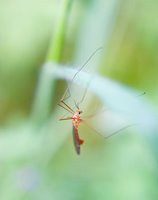DDT: Don’t call it a comeback…
 The United Nations World Health Organization (WHO) announced on September 15, 2006 that they have once again approved the chemical DDT for indoor use after a 30 year ban. DDT, first used in 1943, is an insecticide that was used to kill malaria-carrying mosquitoes. DDT (dichlorodiphenyltrichloroethane) is produced under many trade names. It was banned because of “environmental concerns”. I remember the big concern was that some linked DDT use to the weakening of the shells of Bald Eagle eggs. Weakened shells would cause more breaks in the eggs and ultimately less Bald Eagles. I unsure if scientific studies continue to uphold links like this. Nevertheless, the WHO’s strategy of combating malaria with mosquito nets and malaria vaccine development seems to have been (were?) failed approaches.
The United Nations World Health Organization (WHO) announced on September 15, 2006 that they have once again approved the chemical DDT for indoor use after a 30 year ban. DDT, first used in 1943, is an insecticide that was used to kill malaria-carrying mosquitoes. DDT (dichlorodiphenyltrichloroethane) is produced under many trade names. It was banned because of “environmental concerns”. I remember the big concern was that some linked DDT use to the weakening of the shells of Bald Eagle eggs. Weakened shells would cause more breaks in the eggs and ultimately less Bald Eagles. I unsure if scientific studies continue to uphold links like this. Nevertheless, the WHO’s strategy of combating malaria with mosquito nets and malaria vaccine development seems to have been (were?) failed approaches. Like all chemicals DDT needs to be used responsibly.
“The scientific and programmatic evidence clearly supports this reassessment,” said Dr Anarfi Asamoa-Baah, WHO Assistant Director-General for HIV/AIDS, TB and Malaria. "Indoor residual spraying [IRS] is useful to quickly reduce the number of infections caused by malaria-carrying mosquitoes. IRS has proven to be just as cost effective as other malaria prevention measures, and DDT presents no health risk when used properly.” [1]
The anti-DDT campaign began in 1962.
Rachel Carson kicked-off DDT hysteria with her pseudo-scientific 1962 book Silent Spring. Carson materially misrepresented DDT science in order to advance her anti-pesticide agenda. Today she is hailed as having launched the global environmental movement. A Pennsylvania state office building, Maryland elementary school, Pittsburgh bridge and a Maryland state park are named for her. The Smithsonian Institution commemorates her work against DDT. She was even honoured with a 1981 U.S. postage stamp. Next year will be the 100th anniversary of her birth. Many celebrations are being planned. [2]
But views toward DDT have changed.
Views about the use of insecticides for indoor protection from malaria have been changing in recent years. Environmental Defense, which launched the anti-DDT campaign in the 1960s, now endorses the indoor use of DDT for malaria control, as does the Sierra Club and the Endangered Wildlife Trust. The recently-launched President’s Malaria Initiative (PMI) announced last year that it would also fund DDT spraying on the inside walls of households to prevent the disease. [1]
I’m certain that the “population controllers” are none too pleased with the WHO’s reasonable announcement.
Each year, more than 500 million people suffer from acute malaria, resulting in more than 1 million deaths. At least 86 percent of these deaths are in sub-Saharan Africa. Globally an estimated 3,000 children and infants die from malaria every day and 10,000 pregnant women die from malaria in Africa every year. Malaria disproportionately affects poor people, with almost 60 percent of malaria cases occurring among the poorest 20 percent of the world’s population.[1]
I’m also sure that the use of DDT will, once again, be another “political issue” tossed onto the table. The “anti-DDT” crowd will surely mis-represent the WHO’s position by garnering up images of airplanes indiscriminately dumping chemicals in the middle of the night onto both wildlife and urban areas. The WHO’s announcement was for indoor use only. Using the “outdoor use” straw man, this same crowd, rightly concerned about DDTs ecological aspects, will present the extinction of entire species as a likely outcome.
The “pro-DDT” crowd will welcome the “indoor use” DDT announcement as proof that the WHO recognized its failed strategy to save human lives, combat illness and poverty. Addressing the root of the problem (mosquitoes carrying malaria) with proven measures will be a sign of hope for millions of our brothers and sisters.
“Momma Said Knock You Out” – L.L. Cool J
Photo: Mosquito hanging on a blade of grass ©Adam Tinney
Citations: [1] “WHO gives indoor use of DDT a clean bill of health for controlling malaria” (WHO September 15,2006)
[2] “Call for DDT Opponents to be Held Accountable for Millions of Preventable Malaria Deaths” By Steven Milloy (JunkScience.com)
Tags: DDT, WHO, Rachel Carson


0 Comments:
Post a Comment
<< Home